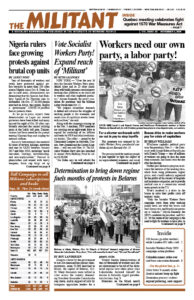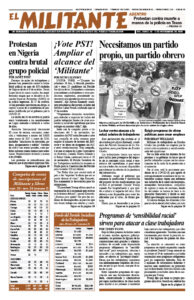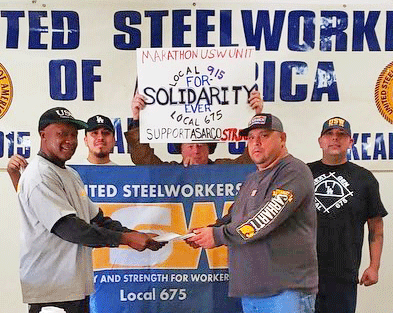KEARNY, Ariz. — “The fight continues,” United Steelworkers Local 5252 President Lyle Murphy told these two Militant worker-correspondents when we stopped by the union hall here. We were in Kearny and other area copper towns Sept. 28-29 to talk with miners about what was accomplished during their bitter strike against Asarco bosses and what they face now.
For nine months, from last October to July, copper miners in Arizona and Texas were on strike at Asarco’s mines and processing plants, battling the company and its international parent, Grupo Mexico. The bosses were out to crush the miners and their unions, the United Steelworkers, Teamsters and five other unions. During the entire strike Asarco refused to negotiate, demanding the miners accept an insulting “last, best and final” concession contract. The miners ended the strike July 6, with the company still refusing to budge.
Three weeks earlier, the National Labor Relations Board in Phoenix filed a complaint against the company, charging it violated federal labor laws, including failing to bargain in good faith. If the charges are upheld, the company will be required to call back all the union workers. The Steelworkers union has documented the company’s failure to reinstate many union miners, while keeping nonunion “replacement” workers in their jobs. Another NLRB complaint based on this information is slated to be tried in January.
Steelworkers locals 5252 and 915 represent miners at the huge Ray Mine that stretches for miles outside Kearny. While some union miners have been rehired there, others, including union officials and strike stalwarts, have not.
Murphy said union representatives need to be working in the mine now to handle safety violations. The company is using supervisors and workers without the needed experience to do training, he said, while refusing to call back experienced union trainers. That’s a danger to everyone in the mine.
Solidarity was key
The miners maintained daily pickets here and at the company’s two other mines outside of Tucson, Mission and Silver Bell; the smelter and concentrator in nearby Hayden; and at Asarco’s refinery in Amarillo, Texas.
They said churches, restaurants and other small businesses in Kearny and other nearby copper towns gave much-appreciated support, donating food boxes, sandwiches, burritos, pizza and more throughout the strike.
“Local 5252 had 14 ‘crossers’ who scabbed,” Murphy said. “Right before the strike 5252 union membership was at 98%. When new people were hired, we talked to them about the union, why they should join. We introduced them to shop stewards, invited them to union meetings. We asked other workers to watch for them on job.”
The bosses tried to divide the new from longer-term workers by offering some miners wage increases while freezing the wages of two-thirds of the others. But they failed, and the unionists went on strike together, with pickets carrying signs saying, “End inequality at Asarco/Grupo Mexico.”
Critical to the battle was the breadth of solidarity the miners received from unions and workers here and across the country, even internationally. They got out the word, sent messages of support, gave donations of food and money, and joined the strikers’ picket lines.
Union members at the Union Pacific Railroad refused to take trains into the Mission Mine. When the rail bosses sent an all-management crew to drive into the mine, the rail unionists joined picket lines protesting this. No other train tried to go in after that.
A delegation from United Steelworkers Local 675 in Los Angeles, including Eli Green, Ocean LaRance and other refinery workers, drove to Kearny with $900 raised from plant gate collections. The local voted to give another $2,000.
The Navajo Nation labor federation from the nearby reservation, the largest in the U.S., donated $5,000. International Longshore and Warehouse Union retirees from three different locals in Seattle sent a check for $500. After hearing a report on the strike from a Chicago Walmart worker who visited the picket line, United Steelworkers Local 1010 in Hammond, Indiana, contributed $2,000.
Walmart workers sent cards from Chicago, Los Angeles and a number of other cities. One Walmart worker from San Leandro, California, delivered $100 along with a card signed by 50 workers in English, Filipino and Spanish that said, “Your fight is our fight.”
“We also received donations directly from people who heard about the strike from the Militant,” Murphy said. The paper carried almost weekly coverage of the battle, and urged workers and unions to support it.
‘Still getting donations’
“We are still getting donations from United Steelworkers locals across the country,” Eduardo Placencio, president of United Steelworkers Local 937, told us when we talked with miners at the union hall in Tucson. Local 937 organizes union miners at the Mission and Silver Bell mines, where the challenge is greater due to the substantial numbers of replacement workers and miners who scabbed in these mines.
Along with fighting to get union stalwarts back to work, Local 937, like the other Steelworker locals, continues to distribute financial assistance to miners out of work or who’ve only been able to find low-paying jobs. This includes former strikers from Steelworkers Local 886 at the smelter and concentrator complex in Hayden that the bosses have shut down. They refuse to tell miners when, or even if, it will open up again.
As in Kearny, support from workers and unions in the area was significant. The Pima Area Labor Federation set up a food pantry for strikers from the Mission and Silver Bell mines at the International Brotherhood of Electrical Workers Local 570 hall in Tucson. The Tucson Education Association donated $500. Machinists union members from Raytheon brought $1,000 in cash and gift cards they collected at work.
Strikers also joined the 1,000-strong Martin Luther King Day protest in Tucson, where organizers invited them to line up in front of the rally.
Seattle rail worker Henry Dennison came to a strike rally Nov. 28 outside Asarco headquarters in Tucson and read a letter from the president of his local, SMART-TD Local 324, and turned over $350 donated for the food bank. Later the local sent another $1,500.
Teachers, nurses, sheet metal, carpenters, Machinists, and airline union members, and Teamster UPS drivers, made donations and walked picket lines. Members of UNITE HERE and the United Food and Commercial Workers union brought lunch for everyone picketing at the Mission Mine when they came to picket alongside the strikers.
On Jan. 27, a labor delegation came from California, including a 52-foot truck full of provisions for the food bank driven by representatives of the Teamsters Joint Council.
In Texas, a Teamster local donated $3,000 to the food pantry of the strikers at the Asarco refinery in Amarillo. Members of Steelworkers Local 13-1 drove over nine hours from Pasadena, Texas, southeast of Houston, to deliver a U-Haul full of supplies to the Amarillo strikers.
International solidarity came from a union representing mining and energy workers in Australia, from bus drivers in New Zealand, as well as from agricultural and oil unions in Colombia. Indigenous and Afro-Colombian groups there sent solidarity videos in Spanish and English.
Pro-strike signs can still be seen in stores and yards in the area’s copper towns. “If you are by yourself against the company, you won’t get anything,” said Jose Martinez, a 10-year veteran of the Asarco smelter. “We need unions!”


